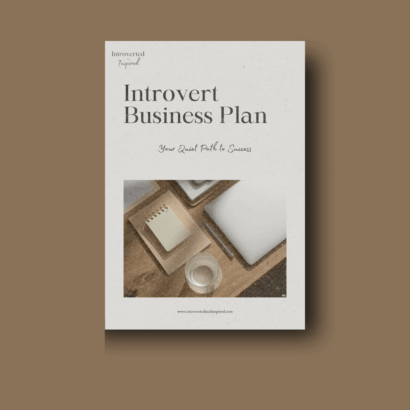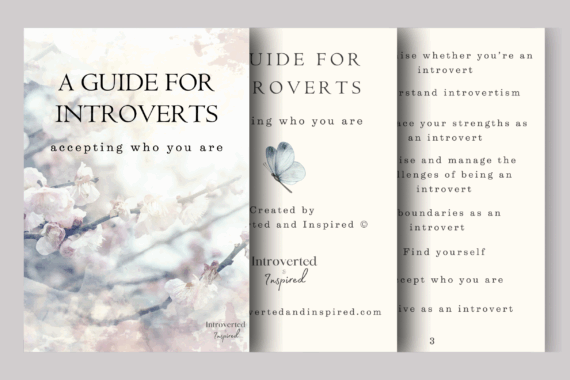Confidence may not be something that comes naturally to us as introverts, but that doesn’t mean we can’t be more confident, especially in ourselves. Trust me, having confidence isn’t reserved for the loudest person in the room. You can be confident and still be quiet, and that’s completely fine.
I’ll admit, there are days when my confidence is definitely lacking, but I know it’s normal and I know it’s okay. I can’t be confident every day. It’s just not in my nature—and that’s something I’ve accepted. Because for us as introverts, confidence looks different. It’s not a scream for attention but rather a ‘this is me feeling comfortable in my own skin.’
If you feel the same way, but believe that your confidence is completely lacking, fear not. I once thought I’d never gain the confidence to do what I do now. I thought I’d never be able to speak up or be successful in the loud ways that so many people seem to be.
But, what I realised is gaining confidence isn’t the flick of a switch but rather a gradual stream of sunlight filling up a room. It’s not just there for us. We need time to build it. And we can. There are ways you can build that quiet strength of yours without pretending to be someone you’re not. Believe that you can become a more confident introvert.
Remember, this isn’t about changing who you are. You definitely don’t need to do that.
Instead, what you need to do is understand yourself as an introvert—because when you know who you are and how you work, the confidence will follow.
After all, confidence isn’t something you’re born with. It’s something you can build on and grow. So, here are some tips to start building that confidence, one gentle step at a time.

Confidence Tips for Introverts
Own Your Introversion
Confidence starts with accepting who you are and owning it. As much as you might feel flawed at times (because you’re quiet or feel out of place in large groups), your introversion is something to be proud of.
Remember, the traits you have make you who you are, and you are unlike anyone else. So, be proud of what makes you you. Yes, you might be an introvert, but you’re unique. And while you might admire qualities in other people, they’re probably admiring your own.
Redefine Confidence
Forget what confidence looks like on other people, especially extroverts. Because confidence isn’t just about being loud or assertive. Redefine it to match who you are.
You might not be the most outgoing person, and that’s okay. Having confidence doesn’t mean you need to become more outgoing. As an introvert, your version of confidence will look different. It might look more calm and collected, more intentional. There’s nothing wrong with that. So, imagine what it looks like for you. Envision it, and believe it is possible.
Focus On One Area of Your Life at First
You don’t need to change everything about yourself or how you do things to gain confidence. I’m sure you’ve heard that often the smallest changes make the biggest difference. That’s why, at first, it’s better to pick one area of your life where you’d like to gain confidence and start there.
When you narrow your focus, you’ll find that things are less overwhelming. In fact, you’ll find yourself more capable of taking meaningful action. And as you grow in that one area, you’ll naturally start to feel stronger and more self-assured in others.
Use Your Natural Strengths to Your Advantage
Believe it or not, you already have strengths to help you succeed and feel more confident as an introvert.
Trust me, there’s no magic formula. No extra ingredient you need to suddenly become a confident and self-assured person. You already have the means to make it flourish. And the answer lies within your natural abilities—the way you listen, the way you think, and the way you observe the world.
Use them as your power moves. Simply let your presence speak for itself—because above all, people are drawn to authenticity.
Gently Challenge Yourself
Confidence can grow through the choices you make and the actions you take, so don’t be afraid to challenge yourself. All it takes is one step outside of your comfort zone to push yourself and build your confidence.
Think about it this way: it’s not about taking the biggest leap, but about giving yourself a chance to realise that you can do things, even if they feel uncomfortable and challenging. Every time you try something unfamiliar, you’re proving to yourself what’s possible and that you’re capable of doing more than you thought.
Reframe Your Negative Thoughts
Our minds, though amazing and powerful, can be our biggest enemy when it comes to filling our heads with doubts and fears. It’s always easy to think of the worst-case scenario. It’s always easy to imagine what might go wrong. And it’s easy to believe those negative thoughts.
But, just because you think something, doesn’t mean it’s true. So, challenge that inner critic of yours. Don’t let it take over. You have the power to reframe any negative into something positive that will then change your way of thinking and how you build your confidence.
It’s okay to be afraid of doing something. Acknowledge and accept when you’re scared, but don’t let it take over or control you. You make the decisions, not your fears.
Ground Yourself
We can’t help feeling overwhelmed at times, especially in loud and fast environments. But there are things we can do to stay centred and calm, even when the world feels like too much.
Grounding yourself is about coming back to the present moment. Back to you. And when you do—through whatever means work best for you, whether it’s journaling or meditating—you create space to breathe and think. Because grounding isn’t just a way of coping, but a reminder that you can handle whatever comes your way.
Focus on You (and Not Others)
I always say, don’t care about what anyone else thinks because no one truly cares that much. What you should really care about is how you think and feel.
Yes—it’s hard not to compare yourself to other people, especially when it feels like everyone else is louder and more outgoing. I get it. I’ve done it. But you’re not on someone else’s journey—you’re on your own one. And trying to compare your confidence or match it to someone else’s is like wearing shoes that don’t fit.
What gives someone else their spark might not be what fuels yours. After all, confidence isn’t one-size-fits-all. It’s something you shape for yourself, in your own way, and in your own time.
Just remember, gaining confidence shouldn’t be about trying to prove yourself to others, but about proving that you can trust yourself.
Put Yourself in the Right Environments
As an introvert, I certainly don’t feel confident in a loud, busy environment, surrounded by lots of people. But I know that I do feel more confident in a less overwhelming environment or even in a busy place, if it’s full of like-minded individuals.
It just goes to show how much of an impact our environment has on us. While we might not be able to show confidence in every space, we can take advantage of the environments where we do feel comfortable.
And that’s when your quiet strengths will start to show. You’ll feel like you belong without having to prove it. And your confidence will grow, purely from feeling like you can completely be yourself.
Practise Showing Up as Yourself
As much as you think it might help to act more extroverted, you don’t need to pretend to be someone you’re not.
Confidence isn’t just an extrovert’s strength, it’s something we all have—even if it’s hidden deep within us. In order to unearth it, we have to be our full selves. That means leaning into your natural way of being, and trusting that who you are is enough.
At first, you might feel vulnerable showing the real you, but that’s where real confidence begins. You don’t have to squeeze into a mould that wasn’t made for you. You just have to embrace the one you’re already in.
Protect Your Energy
Gaining confidence doesn’t mean pushing yourself too far. I know from experience that when I’ve tried too hard, I’ve only burnt myself out and made myself feel worse.
You see, confidence doesn’t need to feel forced. Not everyone and everything deserves your time and attention. What matters is knowing your limits. And knowing that when you reach them, you can give yourself credit and time to restore your energy.
Self-Care and Personal Growth (The Best Confidence Boosters)
Taking care of yourself should always come first. You can’t build your confidence if you feel deflated or worn out. It’s just not going to happen.
But when you meet your own needs and truly care for who you are, you’re telling yourself that you are worthy and capable of building the right amount of confidence for you.
Choosing to rest, reflect, and set healthy boundaries proves that you can put yourself first and trust yourself. And, over time, that trust will become confidence. It stops being something you chase and becomes something you naturally feel.
Here are some self-care ideas for introverts.
Gaining Confidence in Social Spaces as an Introvert
A lot of social spaces are like mazes for us introverts. No doubt we find ourselves wandering aimlessly and feeling lost, and all we want to do is find a way out. There’s been many times (and there still are) where I found myself feeling overwhelmed and drained of all confidence, even if I tried to hype myself up beforehand. The pressure—in fact, everything—can often get too much.
But what I’ve come to realise is that introverts don’t need to match the social energy or confidence of a room; we just need to accept that our energy belongs there just as much, and that our quiet confidence is still confidence.
Here are some things that have helped me to feel more comfortable and confident in social situations, and they might help you too:
- Starting small and engaging with one or two people, rather than trying to navigate the entire room.
- Arriving early, especially before the crowd, to adjust and get a sense of the atmosphere.
- Taking breaks when needed, like stepping outside or having a quiet moment to reset.
- Having some conversation starters in mind to ease nerves and feel more prepared.
- Knowing my exit plan and giving myself permission to leave when I’ve reached my limit.
Remember, confidence isn’t about being loud or seen. It’s simply being present, and owning it. You can be quiet and still connect with others.
And if you feel awkward, that’s okay. You don’t have to know what to say all the time or know how to act. I certainly don’t. But what matters is that you’re showing up—and trust me, each time you do, it gets a little easier.











